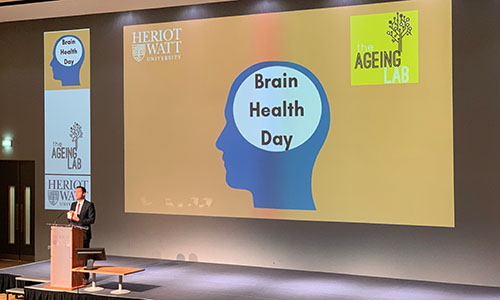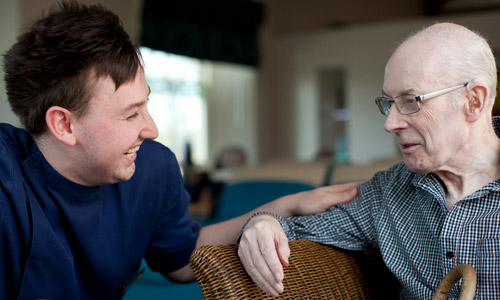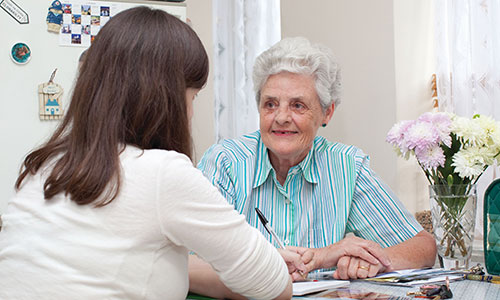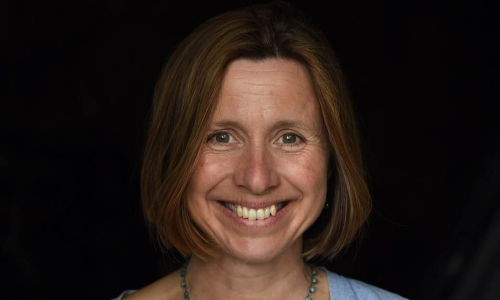The David Hobman Lecture is organised by Age UK and the Institute of Gerontology, Kings College London. This annual talk is in memory of David Hobman CBE, the activist and first director of Age Concern, one of the predecessor charities of Age UK.
"I am very much looking forward to presenting this year’s Annual David Hobman Lecture," said this year’s special guest speaker Professor Andrew Steptoe, Professor of Psychology and Epidemiology, beforehand. "There are many challenging issues surrounding ageing in our society, and there is a pressing need for researchers from many different disciplines to work together to provide high-quality evidence about how we can enhance the ageing experience. I hope to demonstrate how we can use large scale population studies involving expertise from medicine, social science, biology, economics, psychology, and other disciplines to provide insights into healthier ageing.”
Professor Steptoe's one-hour lecture was entitled ‘Ageing, Health, and Wellbeing: Good News or Bad?’ "There is good news and there is bad news," he said, summarising his findings in the intro. "The question is: how do we change some of the bad into better?"
Here are five interesting talking points from the lecture.
1. Older people are dominant in our society
Although there continues to be evidence of ageist attitudes within society, in political terms older people are ruling. Look at our world leaders, for example. Donald Trump, president of the United States is 73. Vladimir Putin, president of Russia is 67. Xi Jinping, President of the People's Republic of China is 66. Both Angela Merkel and Shinzō Abe, the leaders of Germany and Japan respectively, are 65.
It's not just in the world of politics, either — the wealthiest people in business are all older. American magnate and investor Warren Buffett is 89, while Spanish billionaire Amancio Ortega is 83.
2. Being poor affects more than physical health
Wealth and later life mortality are linked, with higher instances of heart disease and dementia among those who are poorer. What's more, poorer people have fewer close friends and lose them more than the richest people, who actually gain friends as they grow older.
Being poor doesn't just affect people's physical health, it can also impact upon their social activity, involvement in organisations and mental health.
Listen to the 2019 lecture in full.
Listen as Professor Andrew Steptoe discusses the issues arising from an ageing population, as well as how health care, social care, digital inclusion and independent living can meet the challenges.
3. Age discrimination impacts health
There is a correlation (but not causation) between higher rates of Chronic Obstructive Pulmonary Disease (COPD), strokes and heart disease in individuals who have been discriminated against.
4. Do emotionally stable and optimistic children make for adults who are the same?
Or can emotionally stable and optimistic adults develop over time? Can 'non-cognitive' life skills such as conscientiousness, emotional stability and optimism be developed and modified over time, or are they simply things you grow up possessing? Experts don't know for sure, but there's ongoing research to find out.
That being said, feelings of purpose in life can be changed and improved. Those who report a strong sense of purpose have lower mortality, and better physical and mental health. Feelings of purpose are personal and can mean different things to different people, whether they're relating to family, friendships, volunteeering or working.
5. Your social-economic status needn't determine your health in later life
People who enjoy life, have more non-cognitive life skills and feelings of purpose enjoy a healthy life expectancy, i.e. the period of time they can expect to live in good health. These factors are more obviously enjoyed by richer people, though aren't entirely dependent on wealth, so can therefore also be experienced by poorer older people.
It's therefore possible for people to help themselves by enngaging in meaningful activities, but there also needs to be top down solutions and society support.
The David Hobman Lecture
Listen to previous lectures about the issues affecting older people, including social care, dementia, spirituality and end of life care.







